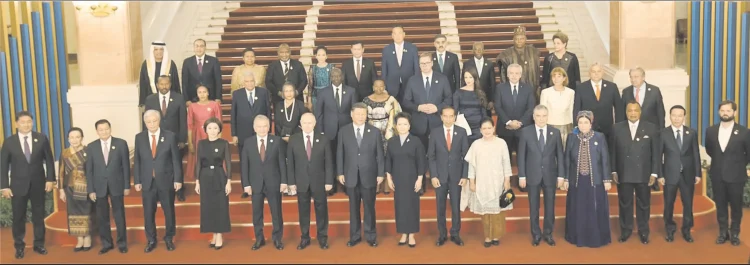China’s Belt and Road Initiative: A Transformative Global Game-Changer

By Ebraheem Faisal Malik:
The Belt and Road Forum for International Cooperation, inaugurated by Chinese President Xi Jinping in Beijing on Tuesday under the theme of “High-quality Belt and Road Cooperation: Together for Common Development and Prosperity,” marks the BRI’s 10th anniversary. This forum, attended by representatives from 130 countries and 30 international organizations, is a crucial platform for global diplomacy.
President Xi Jinping’s presence and keynote speech underscore the forum’s significance. Notably, Pakistan’s Caretaker Prime Minister Anwaarul Haq Kakar’s participation demonstrates the strong relations between China and Pakistan. Kakar’s visit is an affirmation of commitment to the Belt and Road Initiative (BRI) and the China-Pakistan Economic Corridor (CPEC). During the visit, multiple agreements are expected to be signed between China and Pakistan.
The BRI has completed over 3,000 projects in the last decade, gaining support from over 180 countries and international organizations. This international effort reflects the project’s ambition to promote economic development, industrial transformation, green energy, human capital development, and multiculturalism.
Despite geopolitical challenges from the US, EU, and India, the BRI remains strong, and alternative projects like Build Back Better World (BBBW) and Global Gateway (GGW) have yet to materialize. The recent Israel-Hamas war adds further complexity to the region’s dynamics.
The CPEC’s achievements and upcoming goals will be highlighted during the forum. The BRI’s principles of extensive consultation, joint contribution, and shared benefits will be emphasized, underlining the tangible benefits of the CPEC, including substantial investments, job creation, and infrastructure development.
During the forum, Pakistan and China are expected to sign over two dozen agreements, covering areas such as Urban Sustainable Development, Belt and Road Cooperation, Mineral Development, Industrial Cooperation, Gwadar Port Development, Green and Low-carbon Development, and Digital Economy Cooperation. Projects like Main Railway Line-1, Karachi Circular Railway (KCR), Babusar tunnel, and Karachi-Hyderabad Motorway (M-9) will be discussed.
At a time when geopolitics threatens global unity, the BRI stands as a beacon of international cooperation. Over the past decade, it has facilitated economic growth and global partnerships. China’s dedication to openness, inclusiveness, and equal partnerships has resulted in collaboration with over 150 countries and 30 international organizations.
The Belt and Road Forum for International Cooperation will serve as a critical platform for countries and regions participating in the BRI to plan high-quality Belt and Road cooperation. Amidst a complex global geo-economic situation, the forum’s global significance is expected to attract attention from around the world.
In conclusion, the upcoming Belt and Road Forum marks a significant milestone in the development of the Belt and Road Initiative. It underscores the commitment of China and its partner nations to advancing global cooperation and sustainable development. The participation of leaders like Pakistan’s
Additionally, the BRI has made it easier to interchange cultures and advance commercial prospects. Through cooperative efforts, areas become more aware of one another’s languages, cultures, and customs. Through fostering understanding and compassion amongst people, this cultural interchange opens the door to long-lasting relationships that transcend beyond business collaboration.
While recognizing the BRI’s accomplishments, we must also address the concerns and challenges it presents. In any endeavor of this magnitude, complexities and potential pitfalls are inevitable.
One concern revolves around the financial aspects of BRI projects. Critics argue that some participating countries have found themselves burdened with debt due to the financial terms of these initiatives. While infrastructure development is undoubtedly essential, it is vital to ensure that participating nations do not face economic hardships in the process.
Transparency and accountability are additional issues. There have been cases of opacity in the implementation of certain BRI projects, leaving room for speculation and mistrust. To maintain the integrity of the initiative, transparency and open dialogue are paramount.
Moreover, the Belt and Road Initiative has the potential to shape China as a positive global influencer. Many observers perceive the initiative as a strategic means for China to extend its constructive global influence. This perspective highlights China’s role in promoting international cooperation and stability, thereby diminishing concerns about potential power imbalances.
One way to solidify the BRI’s positive impact is by enhancing debt sustainability. China and participating countries should work together to establish fair and reasonable financial terms for projects. This approach will prevent excessive debt burdens and contribute to the long-term success of the initiative.
Accountability and transparency have to be the BRI’s top priorities going forward. It is crucial that all parties involved—including governments, international organizations, and civil society—communicate clearly and openly. This strategy will allay worries about covert intentions and foster confidence.Moreover, the BRI can benefit from a more pronounced commitment to environmental sustainability. As the world grapples with climate change, a greener approach to infrastructure development can set a positive example and align with global environmental goals.
Geopolitical concerns should not be dismissed but rather addressed diplomatically. China, as the driving force behind the BRI, can foster an environment of cooperation and mutual benefit, dispelling doubts about ulterior motives.
The Belt and Road Initiative’s 10th anniversary offers an opportune moment to reflect on its multifaceted impact. While celebrating its transformative infrastructure achievements, we must also confront the challenges and concerns that have arisen along the way.
Careful and inclusive measures are needed to strike a balance between the BRI’s potential for global benefit and its potential for unforeseen downsides. The BRI’s second decade offers a chance to improve openness, advance environmental responsibility, prioritize debt sustainability, and sharpen its strategy.
By resolving these issues, the BRI has the potential to significantly alter the global landscape by promoting interconnectedness, economic growth, and international understanding. As we navigate the future of the BRI, the world watches with anticipation, hopeful that this initiative, which has already left an indelible mark on the global landscape, will continue to shape a brighter and more connected future for all.


